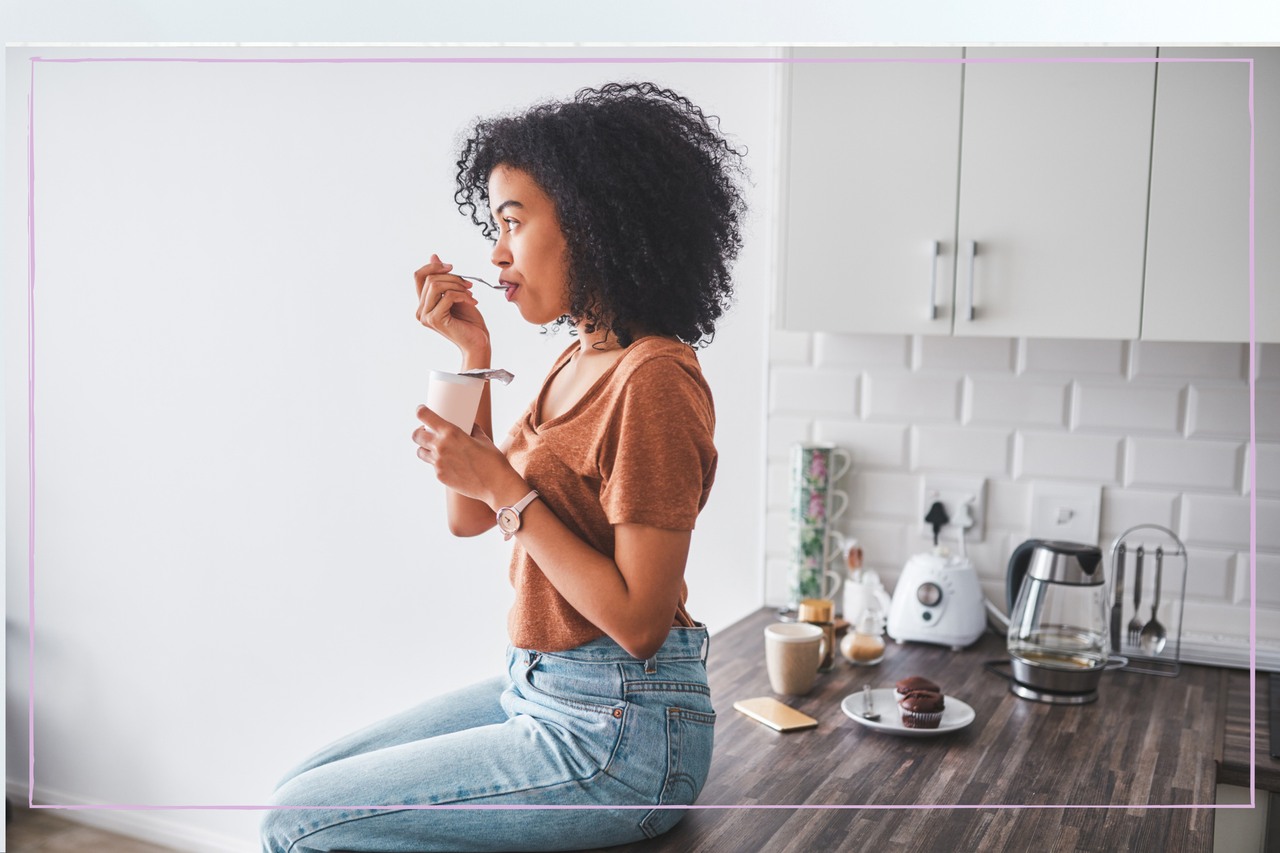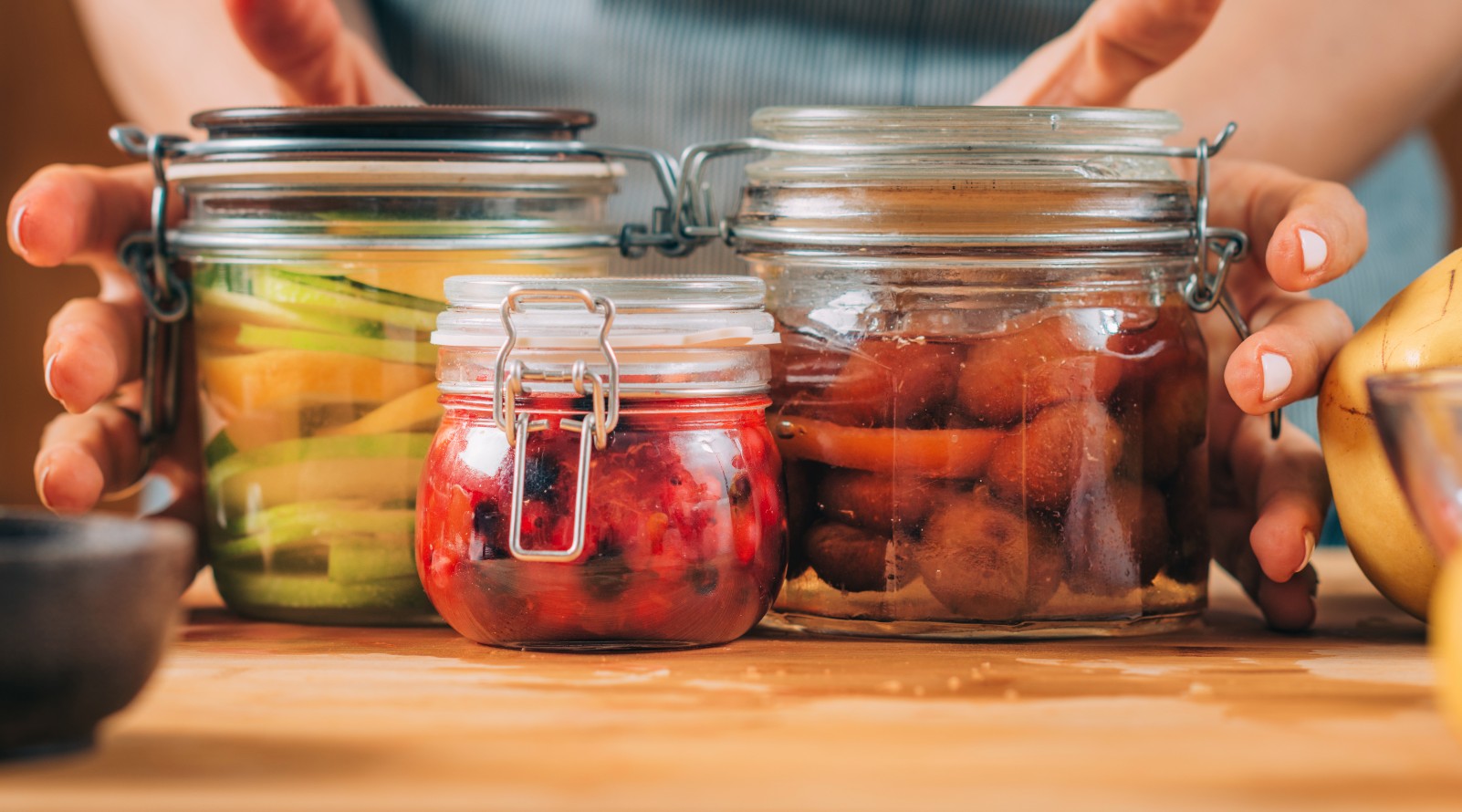
Wondering how to improve gut health? It’s all about getting a healthy balance of bacteria. If you nourish your gut and look after it, you’ll enable the friendly bacteria to thrive – and when your gut bacteria become healthier, you feel better too.
'Good gut health can be linked to the health of many other parts of the body because 70 per cent of the body’s immune cells lay along the digestive tract,' says nutrition expert, Penny Weston. 'While some bacteria are associated with causing illness, others are extremely important for our immune system, heart, weight and many other aspects of health.'
This is because your gut not only helps to digest the foods you eat and absorb nutrients to fuel your body, it also helps get rid of waste and toxins, too. But, if gut isn’t happy, your body will struggle to do this, which can lead to a variety of health problems such as a weakened immune system, poor mental health, as well as cardiovascular diseases and cancer. Luckily, there are plenty of easy ways to show your gut some TLC and boost your health and wellbeing. Here, our experts reveal all...
How to improve gut health
1. Eat fermented food
According to the British Heart Foundation, fermented foods are those that have undergone microbial growth and fermentation. This is where microorganisms such as yeast and bacteria break down food components (eg sugars such as glucose) into other products (eg organic acids, gases or alcohol). This gives fermented foods that unique and desirable sour taste, smell, texture and appearance.
‘Including fermented foods in our diet can give our guts regular exposure to live bacteria. Good food sources include fermented dairy like natural yoghurt or Yakult, sauerkraut, miso, tempeh and pickled vegetables,’ says dietitian and Yakult advisor Lucy Kerrison. Since different fermented foods provide different bacteria, variety is key.

Other fermented foods include:
- Kefir
- Kimchi
- Kombucha
- Cheese
- Sourdough
- Vinegar
Make sure you always read the label when buying fermented foods from the supermarket as some may contain high levels of sugar or additives.
2. Fill up on prebiotics
'Prebiotic foods are high in a special type of plant fibre, which helps look after your digestive system, increasing good bacteria in the gut and also improving metabolic health,' says Penny.
'Prebiotics come from types of fibre that humans can’t actually digest but the good bacteria in your gut will eat. Prebiotics are found in many fruits and vegetables, especially those that contain complex carbohydrates.'
Research from the American Gut Project found that individuals who eat over 30 different plant foods a week have a more diverse gut, compared to those who eat ten. A varied diet packed with plant foods also benefits your mood, weight and overall health and wellbeing.
'Upping your intake of plant foods doesn’t have to be difficult or expensive, and it is not just the more obvious healthiest vegetables and fruit which counts, but also legumes such as beans and lentils, wholegrains, nuts, seeds, herbs and spices,' says Lucy.
Prebiotic foods include:
- Jerusalem artichoke
- Garlic
- Onions
- Leeks
- Asparagus
- Bananas
3. Boost your probiotic intake
Asking yourself 'Prebiotics and probiotics for gut health: what's the difference?' Simply put, probiotics are live bacteria and yeasts, which help to restore the balance of gut bacteria after it has been affected by illness and can help ease the symptoms of IBS. Prebiotics, on the other hand, are a type of dietary fibre, and are found in foods such as leeks, onions and garlic, which feed the friendly bacteria in your gut, such as Lactobacillus and Bifidobacterium.
Probiotic foods include:
- Sour cream
- Pickles
- Miso soup
- Yoghurt
- Aged cheese
- Kombucha
4. Take supplements
While you can get the majority of good bacteria through your diet, taking a prebiotic or probiotic supplement can give you extra benefits.
A study published in the journal Alimentary Pharmacology & Therapeutics found that people with irritable bowel syndrome (IBS) saw improvements in stool consistency, reduction in bloating and gas, and even improvements in anxiety after taking a prebiotic supplement.
You can take prebiotics and probiotics together. However, it's recommended to wait around 15 minutes to avoid bloating. Take your probiotic first thing in the morning.
5. Reduce alcohol
Alcohol is a gut irritant. 'If you drink alcohol in excess, it can interfere with the production of digestive enzymes and juices so it becomes harder for your body to digest and absorb nutrients from food,' says Penny.
'This can lead to excessive fermentation in your gut, which causes bloating, gas and loose stools.' Alcohol also increases cravings for processed, sugary foods which can make these symptoms worse. Why not swap for one of the best non-alcoholic wines instead?
'Drinking water during or after a meal will help your body break down and process food and therefore help the digestion process,' says Penny. 'This breaking down of food helps your body to absorb those important nutrients and flush out the toxins. It also helps make your stools softer, preventing constipation.'
6. Snack on dark chocolate
Yes, eating this sweet treat really does have health benefits. Dark chocolate contains fibre that moves undigested through our digestive tract to the large intestine where our probiotics feed off of it to grow and boost our health.
Research published in Nutrients found that the flavanols in chocolate help reduce inflammation in the gut – which can cause chronic constipation, abdominal pain and nausea. Another study published in The Journal of Nutritional Biochemistry found that the polyphenols in dark chocolate reduced the risk of colon cancer and intestinal anti-inflammatory disease.
To reap the most benefits, opt for 70% cocoa chocolate and stick to just the recommended 30g of chocolate a day – that's roughly three to four squares.
7. Limit artificial sweeteners
While sweeteners are often used as an alternative to sugar when dieting, or simply cutting down your intake for other health reasons such as diabetes, they can wreak havoc with your gut microbiome. This is because the GI tract doesn't break down sweetener in the same way it does sugar and other processed foods, meaning when they reach your digestive tract, they're undigested.
However, unlike dark chocolate, studies have found that this causes sweetener to negatively impact your gut bacteria, even reducing some of the good stuff! Findings published in The International Journal of Molecular Sciences showed that excessive consumption of artificial sweeteners can become toxic to the gut, leading to health problems such as damage to the liver and intestines.
As well as the sweeteners you add to your own drinks, they can also be found in shop-bought items, such as:
- Diet/ sugar-free drinks
- Energy drinks
- Baked goods such as pastries and cakes
- Sugar-free condiments such as ketchup
- Granola and other cereals
- Greek yoghurt
Aim to stick to the acceptable daily intake (ADI) of artificial sweetener which is 50 milligrams for each KG of body weight.
Signs of poor gut health
'Due to the gut-brain axis, which is the direct link between the gut and brain, gut health can have a big impact on mood, mental and physical health, energy and overall wellbeing,' says Lucy. 'Low mood and energy, disrupted sleep and poor immunity can all be signs of poor gut health because of this connection.'
Other signs of poor gut health include:
- Changes to your stools. If your stools are harder and painful to pass you might be dehydrated or not have enough fibre in your diet. Usually, constipation home remedies will help this. If you don't see improvement after a week, book an appointment with your GP. If your stools are a colour other than brown, such as green, black, red or yellow, you should also see your GP,' says Penny. 'With a healthy gut, your poo should also be smooth in a sausage shape and should sink in the toilet bowl. If it floats, it means there could be undigested fat in the poo.'
- Stomach pain: 'Cramping or bloating for example, might also be indications of gut health problems. Bloating can signal stress, indigestion or a reaction to a specific food,' says Lucy.
- Headaches: This is due to the connection between the gut and the brain, and inflammation. The more inflammation there is in the body, the more pain that manifests. For people with celiac disease who also experienced migraine symptoms, research published in Medical Hypotheses found that reducing their gluten intake (and therefore, inflammation) for six months saw a big improvement in the number of migraine attacks they had.
- Bad breath. 'Not passing poo properly can cause a build up of toxins in the body, resulting in bad breath,' says Penny.
Worst foods for gut health
- High protein intakes: Around 15% of protein is malabsorbed, high intakes in the absence of fibre can have a negative impact on the microbiome. What is key here is not to avoid protein, but to ensure a good protein: fibre ratio.
- High levels of saturated fats: These tend to be solid at room temperature and are within animal products as well as foods such as crisps and chocolate. In high quantities, these can cause inflammation.
- High alcohol intake: Alcohol is an irritant, affecting the guts ability to absorb water and nutrients from food.
- Low fibre intake: Fibre can help strengthen gut muscles, draw in water to soften stools and also add roughage to the gut so there is more to ‘grip on to’. Make sure you’re eating a range of different fibre types including vegetables, wholegrains, nuts and seeds to feed your gut optimally.
Lucy recommends limiting the above in your diet if you're looking for ways to improve your gut health.







